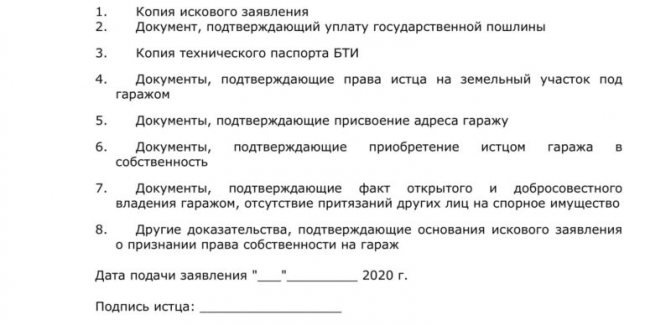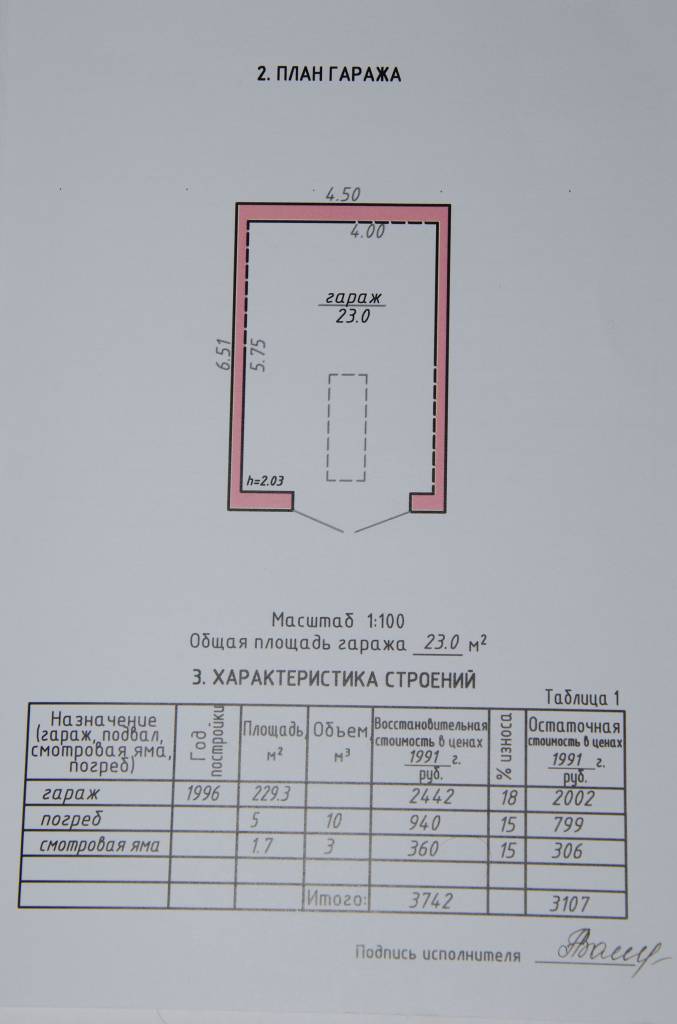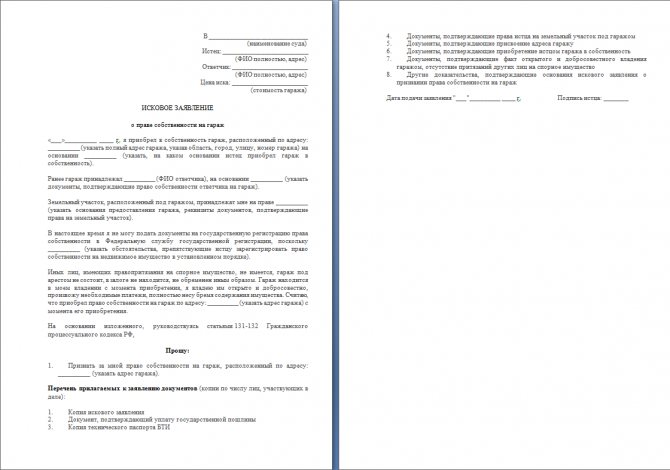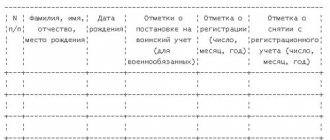Home / Housing disputes / Privatization of a garage in a garage cooperative: procedure, general information
Owning your own garage is the cherished goal of many car owners and business owners. However, as long as the garage belongs to the state or a garage-building cooperative (GSK), you will not be able to make the garage your own. Therefore, today the privatization of a garage in GSK is becoming increasingly popular.
Private ownership of a building provides undeniable advantages - this includes the opportunity to sell, rent, bequeath, donate or mortgage a garage. As soon as a building becomes private property, it falls under state protection. Let's look at the procedure and nuances of privatizing a garage in GSK according to the new rules.
You can also familiarize yourself with the nuances of the procedure for ordinary real estate - in the article “How to privatize an apartment, housing?”
Is it possible and necessary to privatize a garage in a garage cooperative?
The organization of garage-building cooperatives in the Soviet era had a clear focus - to allow citizens to use garages. Despite some restrictions, such buildings passed from hand to hand. Moreover, the object of transfer was not only the garage, but also the land plot under the foundation.
Now there is a so-called cooperative membership . Participants use garages and make share contributions to the general fund of the cooperative. The status of a member of the GSK allows you to privatize a building on the basis of two provisions: Federal Law No. 93 or, simply, the “dacha amnesty” and Law No. 1541-1 of July 4, 1991.
If a shareholder decides to register ownership of the garage, he will become not only the manager of the building, but also the owner of a share in the common property of the cooperative. Land, unlike a garage, cannot be the object of privatization - it belongs to the state or municipal associations.
Advantages and disadvantages
In order to evaluate the advantages and disadvantages of privatizing a garage in a garage cooperative, let's take a look at the comparative table:
| Advantages of garage privatization in 2020 | Disadvantages of garage privatization in 2020 |
| The sole right to dispose of the building: sell, rent, include in a will, donate and pledge for a loan (mortgage) | Obligation to pay annual property tax |
| Receiving compensation from the authorities in case of seizure of a garage for public needs | Making payments for the use of land under the garage |
| Confirmation of the legality of garage ownership, difficulties with challenging construction rights | Risk of accumulating debt |
Thus, the main advantage of converting a garage into private ownership is sole ownership of the property. The main disadvantage is the obligation to pay taxes.
Privatization of a garage in a garage cooperative
The garage construction cooperative (GSK) and each of its participants have preferential rights to privatize land under garages. The owner of the garage, according to Art. 218 of the Civil Code of the Russian Federation is a citizen who has paid for his share in full. The procedure for privatizing a garage consists of two stages , since it is necessary to take ownership (register) not only of the garage itself, but also of the plot of land underneath it. In the case of GSK, the land under all the garages of a given cooperative is registered as the shared ownership of all its participants, since otherwise it would be necessary to divide the site under the cooperative into independent objects and assign them independent cadastral numbers, which is much more difficult and expensive.
Why do you need to privatize a garage?
After privatization is completed, each of the participants will be able to dispose of the garage at their own discretion. If the municipality wants to seize this plot of land and build something on it, then each of the participants will receive compensation for their garage equal to the cost of the building and the plot of land. It is quite difficult for everyone to submit documents for privatization on their own behalf. It’s cheaper and easier to unite and entrust the registration to a representative - the chairman of the GSK.
The garages themselves are of two types : detached or combined into one building, when all the boxes have common walls. A detached garage can be privatized independently, but the owner of the box will not be able to begin this procedure without the consent of all other owners. If one of the owners is against it, the rest will have to formalize and notarize his refusal in order to continue the procedure.
It is possible to obtain the support of all owners at once only by organizing and holding a general meeting of GSK participants. At the meeting, the need to prepare documents should be explained and a representative should be elected in whose name a power of attorney should be issued to carry out actions to privatize garages and land.
Which garages cannot be privatized?
Only the garage is subject to privatization, while the land plot remains under the jurisdiction of the cooperative on the basis of shared ownership. The procedure will become possible only under one circumstance - if the privatization is approved by the management and all members of the State Joint Stock Company.
It will not be possible to privatize a garage that is recognized as an unauthorized construction. In other words, it was erected without permission from the authorities, for example, during the period of Perestroika. Before you privatize such a garage, you need to legalize it. This can only be done in court (see “How to legalize unauthorized construction”).
How to privatize a garage?
Let's move on to consider the features of transferring a garage from GSK to private ownership. Let us immediately note that the procedure is not easy. Usually the chairman of the cooperative is responsible for all the formalities. But there is an option in which the garage user makes the appeal.
Procedure
Where to start or step-by-step instructions on how to privatize a garage box in 2020 (option for a cooperative):
Step 1
Obtain or check a garage cooperative membership certificate. There must be two signatures here: the chief accountant and the chairman of the GSK. Accordingly, there are two seals. Similar information must be checked on the certificate of payment of the share contribution for the garage.
Step 2
If you are carrying out the procedure yourself, ask the chairman of the GSK for a certificate of transfer of land to the cooperative. Make a copy or ask the chairman to make one. There is no need to have the lease agreement certified by a notary, but if possible, it is better to have it certified. In addition, you will need to make a copy of your passport.
Step 3
Visit the Bureau of Technical Inventory (BTI). Apply for a technical plan. Before this, you need to pay the cost of the procedure and provide a receipt. A specialist from the company will come to the assessment site and take measurements. Usually, with a collective application, an assessment of the entire territory of the GSK is ordered. Based on the results of measurements, BTI issues a technical plan.
Step 4
The next step is to contact the MFC “My Documents” or Rosreestr. Registrars will check the documents for compliance. There you will also need to write an application for privatization of the garage to the GSK. The state duty is paid in advance (either at the bank or at the MFC). Then you can submit documents for registration, and the registrar will issue a receipt confirming their acceptance (with the date of the next visit).
Step 5
Receive an extract from the Unified State Register of Real Estate - confirmation of registration of property rights (until 2020, colored certificates were issued). The information reflected in the documents is needed to calculate the tax amount.
Expert opinion
Semyon Frolov
Lawyer. 7 years of experience. Specialization: family, inheritance, housing law.
Note that the main difficulties are associated with the first two stages of the procedure. It is advisable that the chairman of the GSK handle the registration . This ensures that the procedure takes place in accordance with established rules. But if you are privatizing a garage yourself and don’t know what needs to be prepared, contact a lawyer.
Statement of claim for privatization of a garage in court (sample) 2020
The most difficult thing is to privatize a garage through the courts. But this is a necessary procedure, especially if there is a dispute regarding the origin of the building. Cases are heard in district courts at the location of the property.
What to include in the statement of claim :
- name of the judicial authority;
- Full name and full information about the plaintiff, defendant, third parties;
- information about the date of acquisition of the garage, the exact location of the building, the basis for the acquisition, who owned it and by what right;
- information about the impossibility of privatizing the garage - note the reason(s);
- indicate that the plaintiff acquired the garage legally and pays shares;
- requirement - to recognize ownership of the garage;
- list of documents;
- date in the format “hh.mm.yyyy”;
- plaintiff's signature.

The appeal is sent to the court office. The plaintiff must prepare copies of documents (originals may be needed at meetings). Now you can file claims electronically via the Internet. For this purpose, there is the State Automated System “Justice”. The plaintiff needs to have access to the Unified Information System and State Services.
Documents required for privatization of a garage
Registrars carefully check the submitted information. If it turns out that something is missing, privatization will drag on for an indefinite period of time. To avoid troubles, you need to prepare a complete package with up-to-date data.
What is included in the list of documents for garage privatization in 2020
:
- written application for privatization;
- original receipt for payment of state duty (not to be confused with the cadastral value of the garage);
- certificate of membership in the cooperative (certified by the seals and signatures of the responsible persons);
- confirmation of payment of the share contribution;
- a copy of the applicant’s passport or power of attorney (notarized);
- a copy of the certificate of granting land ownership to GSK;
- technical plan (passport) of the garage and the area underneath it;
- document confirming ownership of the building.
If the privatization of a garage is refused, you must go to court. In addition to these documents, you will need a statement of claim and a receipt for payment of legal costs.
Should the garage be privatized?
In the understanding of citizens, privatization is the registration of property rights. Oddly enough, the Law “On Privatization” has nothing to do with the acquisition of ownership of garages; this procedure is regulated by the Civil Code and the Law on State Registration of Real Estate Rights. Therefore, the question of whether it is possible to privatize a garage in accordance with the Federal Law “On Privatization” disappears.
Within the meaning of Part 4 of Article 218 of the Civil Code, a member of the GSK, who has fully contributed his share, acquires ownership of the garage. The second article of the law “On State Registration” states that state registration of rights is recognition by the state and confirmation of the fact of a person’s ownership of property. The fifth article of the law states that only the owner can be a participant in real estate transactions.
In the future, you may want to sell your garage (there are such situations). Read how to register a purchase and sale here.
It follows from this that by making a share, ownership of the garage arises, but until it is registered, no transaction can be registered - no purchase or sale, no donation, no exchange. What if you urgently need money that you can only get from selling your garage? Or will an excellent exchange option come up? The moment may be missed, because the time spent on privatization may not be enough. Therefore, it is necessary to privatize the garage.
How much does it cost to privatize a garage?
Re-registration of a garage box is considered a free procedure. There is no need to pay for privatization, but government registration services are paid.
How much will you have to pay:
- Obtaining a technical plan (passport) from the BTI - from 5-8 thousand rubles .
- Preparation of a cadastral extract - the amount is determined based on regional standards.
- State duty – 2,000 rubles .
- Going to court (if necessary) – 300 rubles (Article 333.19 of the Tax Code of the Russian Federation).
- Contacting specialized companies – from 20 thousand rubles.
There is also a notary expense item. For example, for approving a copy of a land lease agreement for GSK. The final amount of payment for notary services can be found in the price list of the selected office. Typically, expenses range from 1,000 to 5,000 thousand rubles.
Timing for garage privatization
Many people ask how long will the procedure take if all the documents are collected?
If there are no problems, an extract from the Unified State Register of Property Rights will be issued within 3-10 days from the date of contacting Rosreestr. If you act through the MFC, the deadlines increase by 2-3 days - the period for sending documents to the department.
The applicant also confirms ownership of the garage. It usually takes up to 14 days for the administration to review documents. The total time for privatization of a building in GSK is from a month or a little longer.
Garage privatization
The list of documents that must be obtained to register private property is significant.
You can entrust a lawyer to do this, but it will be much cheaper to do it yourself, although not so quickly and easily.
What will you need?
The owner of the building should contact the chairman for a certificate from the GSK.
Then you should go to the BTI to obtain the exact address of the future property. The construction plan is also ordered immediately. The next step will be to apply to Rosreestr for a cadastral passport. After receiving the documents, you can proceed to registering the property under the new owner.
Example of a technical plan:

Required documents
- Cadastral passport
- Technical plan of the facility
- Extract from the Unified State Register
- Application from the person privatizing the garage
- Photocopy of his passport
- Certificate from the chairman of the GSK that the shares have been redeemed
- GSK Agreement
- Tax registration certificate
- Certificate of registration of the cooperative, charter, protocol confirming the competence of the chairman.
- Permission for its operation
- Land lease agreement with the municipality
- Receipt with paid state duty
- Extract from the Unified State Register of Legal Entities with the number of the garage cooperative.
There are many nuances to the privatization procedure. The process of transferring ownership depends on specific nuances, for example, the time of construction of the object, the basis for obtaining the land, whether construction was permitted.
Sample application

What to do if there are no documents for the garage?
Title documents for the garage confirm that the building was erected legally. But what if there are no such documents? Most often, such problems concern owners of detached buildings that are not within the area of responsibility of GSK.
Step-by-step instructions for privatizing a garage without documents will be as follows:
- Submit an application to the district administration in order to obtain a duplicate of the decision to provide a plot of land for a garage.
- Order an examination of the site from the Bureau of Technical Inventory (BTI).
- Obtain a technical plan of the established sample.
- Pay the state fee, collect documents.
- Contact the MFC or Rosreestr.
- Wait for an extract from the Unified State Register of Property Rights to be produced.
If this does not work, you will have to go to court with a claim to recognize the ownership of the unauthorized construction.
The most difficult and important stage is obtaining a copy of the decree on the transfer of land for construction. If there is no such document, the authorities may recognize the garage as an unauthorized construction. According to the law, it is subject to demolition at the expense of the violator (Clause 2 of Article 222 of the Civil Code of the Russian Federation).
Read what it is and what it threatens:
“Demolition of an unauthorized building”
“Fine for building without a building permit”
“How to obtain a building permit if the house has already been built.”
Legal nuances when registering
You should be aware that in the absence of the required documents, the applicant will be denied registration of the garage sale or purchase transaction or the registration will be suspended indefinitely.
Often a citizen does not have documents for land or a garage, since many compatriots treat objects such as garages irresponsibly.
This can cause serious negative consequences, in particular:
| Demolition of an unauthorized building | In accordance with Art. 222 of the Civil Code of the Russian Federation |
| Fine for construction of a real estate object on someone else's land plot | For example, in the courtyard of a residential apartment building, only persons with disabilities are allowed to have a personal garage and subject to the established procedure |
| Loss of a property | when erected on a site other than one’s own, the building may be transferred to the ownership of the land owner |
To implement any type of real estate transaction, you cannot do without the necessary documents. It is important to remember that documents for a garage are needed both when buying and selling, as well as for privatization or construction of a real estate property.
This is important to know: How to give up a garage that you own
Video: Registration of a garage through the court. Property documents
Until what year has garage privatization been extended?
Simplified free privatization of buildings was available to all citizens of our country until March 1, 2020. A subsequent decision by the Government to extend the deadline may follow soon. But with the same success, a solution may not follow. Now citizens will have to provide not only the title documents for the garage, but also permission to put the facility into operation.
The situation with the privatization of the garage will not change - only the building itself is provided free of charge. The land plot underneath belongs to GSK on the basis of a lease agreement with the municipality. Members of the cooperative have certain shares in the plot. They pay for the use of the land out of their own pockets into the general fund of the cooperative.
What is a “garage amnesty”
On July 22, the head of the Russian government, Mikhail Mishustin, spoke in parliament. During his speech, the Prime Minister announced a new “garage amnesty” law. He stated that the bill is already fully prepared and will soon be submitted for consideration to the State Duma.
The “garage amnesty,” according to Mikhail Mishustin, will affect 4.5 million citizens. This law will be useful for those who cannot privatize a garage in a garage cooperative. If parliament and the Federation Council approve the bill, it will come into force in 2021. The chance to privatize the garage will be valid in the country until 2025.
You can privatize detached boxes and those garages that are located in a garage cooperative. Will not be affected by the shell law. Such garages cannot be considered real estate.
Is compensation possible for a privatized garage?
The seizure of land under garages for state and municipal needs does not happen on its own. Before alienating a privatized garage, the authorities compensate losses to its owner - by virtue of Art. 56.8 of the Land Code of the Russian Federation. This happens in two main ways:
- Garage buyout
This is a fairly common practice, although the law does not specifically say anything about it. This is more of a way out of a domestic situation. The purchase of a garage for the needs of the state involves the conclusion of a purchase and sale agreement . The parties are the garage owner and a representative of the local administration.
The main terms of the agreement are for the owner to transfer the right to dispose of the garage, and for the buyer to pay the amount stipulated in the agreement for the alienation of the garage from the owner. The main criterion of the transaction is remuneration. If the terms of the agreement are violated, the purchase of the garage can be challenged in court.
- Compensation
Before demolishing the garage, the administration notifies the owner of its intentions. The notice contains proposals to the owner, one of which is payment of compensation in cash. To receive the amount for the demolition of the garage, the owner applies to the city administration or the prefecture. You will need to confirm ownership of the garage and write an application.
Please note that compensation only applies to permanent buildings. Garage boxes made of metal structures are not included in this category. Consequently, they are demolished without compensation to the owner.
Refusal to privatize a garage
The documents have been collected, the technical plan has been drawn up, the application has been written - is it possible to get a refusal to privatize the building? Of course, and most often the culprits are the citizens themselves.
Grounds for refusal to privatize a garage:
- shortcomings in the documentation - errors in cadastral information, spelling inaccuracies, etc.;
- discrepancy between the technical plan and the real state of affairs - for example, ½ share instead of ¼ and other shortcomings;
- lack of information about the owner or inability to identify the owner of the garage;
- payment of the share in incomplete amount;
- provision of expired documents;
- absence of a power of attorney - if a third party acts on behalf of the applicant.
The process will drag on if the citizen or the chairman of the State Committee does not provide a complete package of documents. The slightest mistake threatens to result in problems with the privatization of garage buildings. That is why it is advisable to entrust the procedure to a knowledgeable specialist from among the lawyers of our portal.
Well, for now let's summarize.
Summary of the above:
- Privatization of a garage is a form of transformation of ownership (from state or GSK to personal or shared ownership).
- The main advantage of privatization is the registration of ownership rights. If the building is not privatized, it cannot be disposed of (sold, leased, donated, bequeathed).
- Before privatizing a garage, you need to obtain the consent of the GSK management.
- Unauthorized buildings can only be registered through the court.
- The applicant collects documents, including a technical plan and a certificate of membership in the cooperative.
- Registration takes place through the MFC or at Rosreestr - based on a citizen’s application.
- If the building is part of a common box, garage workers need to unite and submit a collective appeal (but notarial refusals are allowed).
- Refusal to privatize is usually associated with the absence or shortage of documents.
Legal assistance
Modern privatization of garages in a cooperative has many pitfalls. Only a qualified lawyer can predict how the process will unfold and whether a refusal will follow. Independent participation in privatization is fraught with various problems. Usually this is a lack of documents, errors in the application, contacting unnecessary authorities, delays in issuing a certificate, etc.
Free legal advice on the privatization of garages helps to avoid unnecessary difficulties.
Our portal’s lawyers are well acquainted with the procedure. If you are experiencing difficulties with privatization or want to find out what you need from the documents, contact us for a free consultation. The participation of a lawyer eliminates the mistakes that unprepared citizens make. Together with us, you will successfully register ownership of the garage in the cooperative. Attention!
- Due to frequent changes in legislation, information sometimes becomes outdated faster than we can update it on the website.
- All cases are very individual and depend on many factors. Basic information does not guarantee a solution to your specific problems.
That's why FREE expert consultants work for you around the clock!
- via the form (below), or via online chat
- Call the hotline:
- Moscow and the Region
- St. Petersburg and region
- FREE for a lawyer!

By submitting data you agree to the Consent to PD Processing, PD Processing Policy and User Agreement.
Anonymously
Information about you will not be disclosed
Fast
Fill out the form and a lawyer will contact you within 5 minutes
Tell your friends
Rate ( 2 ratings, average: 5.00 out of 5)
Author of the article
Maxim Privalov
Lawyer. 2 years of experience. I specialize in civil disputes in the field of housing and family law.
Author's rating
Articles written
610










